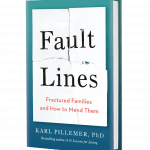I sat with Susan, a petite and lively 85 year old and talked about growing up in the rural south, her work and her two marriages. Susan, despite a daunting array of health problems, is a funny, lively person. She likes a drink or two and enjoys her activities with friends in her assisted living community.
Susan, despite a daunting array of health problems, is a funny, lively person. She likes a drink or two and enjoys her activities with friends in her assisted living community.
But the atmosphere changed in an instant when I asked her, “What advice would you give for having a good relationship with your grown children?” Susan became very still, holding her breath. Then words nearly exploded from her, and she pounded her hands in frustration on the arms of her chair.
I don’t know, I don’t know! I did something wrong, I’ll tell you right now! Because I don’t hear from either one of my kids. I don’t even — I never hear from them. And it hurts like crazy. Why do you think that is? Do you have any idea?
Susan did have a possible explanation for the estrangement from her children:
I think when I married the second time it was such a different life, it was such a different life from what we had lived before. And I was so occupied, and we went all the time, and my life was so busy so I lost track of them, being close to them. They weren’t exactly unhappy about it; we just had nothing in common anymore. And after I married again — I don’t think they really resented my second husband, but they just didn’t have anything in common.I think that’s where it began. But I do wish I’d hear from them more often now, yes I do!
By the time I ended the interview, Susan had recovered and was back to telling me colorful anecdotes about her long life. But I’ve never forgotten the anguish in her voice as she told me: “I did something wrong … And it hurts like crazy.”
Among the saddest people I met in interviews with older Americans for the book “30 Lessons for Living” were those living in this situation. The destruction of the parent-child bond was a persistent source of melancholy, a feeling of incompleteness that weighed down the soul. And the one failed relationship is not necessarily mitigated by having warm, fulfilling ties with other offspring. Almost all of the elders who found themselves with one child who was “lost” to them or with whom there was “bad blood” felt unresolved or incomplete. Such feelings only became more acute as they neared the end of life.
Fortunately, the elders interviewed for the project offered suggestions from their long experience for avoiding family rifts or patching them up before they occur. Here are several of their tips:
See the potential rift early and defuse it.
The elders acknowledge that once the rift sets in, it takes on a life of its own and becomes much more difficult to repair. The time to act is when the first warning signs show themselves. Martha, 74, who had a major blow-up with her son and daughter-in-law, said: “I should never have let things deteriorate the way they did. Looking back, I could see problems brewing and I couldn’t hold back from criticizing my daughter-in-law.” Parents of adult sons and daughters need to ask themselves: Is the battle worth it? The elders told me that usually it’s not.
Act immediately after the rift occurs.
The elders warn that the viewpoints of both parties harden quickly; in a relatively short time it becomes easier not to make the effort to reconcile than to try to do so. The new reality sets in fast; therefore, the time to “make things better” is as soon as possible after the blow-up.
Janice, 72, spoke about her problems with her daughter Gloria: “After our big fight, I should have had a heart-to-heart with Gloria right away. After a week or two, we were both so angry — and I guess hardened — that it was terribly difficult even to start a conversation.”
In contrast, Maria, 82, was very disappointed and angry at her son, because he would not help Maria care for his father during his last illness. But she decided to act as soon as possible. She sat down with him and told him exactly how she felt, allowing a reconciliation to take place. “It’s worth it,” she told me, “not to feel like I might lose what I have that’s good with my son.”
It’s often the parent who needs to compromise.
I am well aware that this sounds unfair; however, in my review of the accounts of intergenerational rifts, it’s usually the parent who pays the higher price if a rift occurs. Older mothers and fathers tend to invest more in the relationship as they get older and therefore stand to lose more by letting it disintegrate. Particularly acute is the separation from grandchildren that can occur as a result of the rift.
Many elders recommended that parents try their best to “forgive the unforgivable.” Some have had the worst happen, stood on the brink of the rift and decided that it still wasn’t worth the end of the relationship with the child.
So here’s a key life lesson from America’s elders: Avoid the rift. Of course, it is possible that a child’s behavior is so damaging or dangerous for a parents’ physical or mental health health that separation is needed. But the elders tell us that rifts usually occur over less extreme matters that seem important at the time but are almost never worth the pain of separation when you reach your later years.
 an unhappy feeling about their childhoods, parental favortism was right up at the top. I had respondents in their seventies, eighties, and nineties tear up about memories of being the unfavored child.
an unhappy feeling about their childhoods, parental favortism was right up at the top. I had respondents in their seventies, eighties, and nineties tear up about memories of being the unfavored child.







